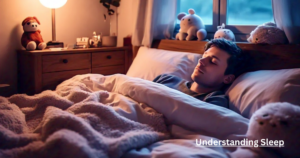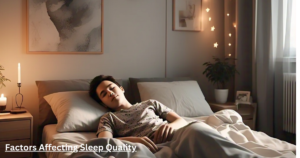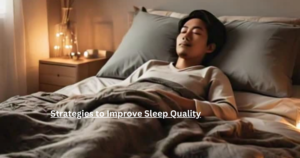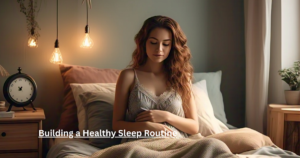Introduction
A healthy sleep routine is crucial for mental and physical health. Insufficient sleep can lead to fatigue, weakened immunity, and stress and is linked to conditions like diabetes and heart disease. This article explores tips to improve sleep quality and its benefits.
Understanding Sleep

Sleep is vital for physical and mental health, with restorative functions like memory consolidation and cellular repair. A healthy sleep routine boosts mood, cognition, and overall well-being. Prioritize sleep for a healthier life and enhanced vitality.
The Science of Sleep

Signs of Poor Sleep Quality
Factors Affecting Sleep Quality

Environmental Factors
The sleeping environment plays a pivotal role in determining the quality of rest. Excessive noise, light exposure, and an uncomfortable room temperature can disrupt the sleep cycle. Blue light from screens, mainly when used close to bedtime, suppresses melatonin production and interferes with natural settlement. rhythms.
Lifestyle and Behavioral Factors

Irregular sleep schedules, consumption of stimulants like caffeine or alcohol, and a lack of physical activity all contribute to suboptimal sleep. These habits disrupt the body’s ability to maintain a consistent and healthy sleep cycle, making it harder to achieve more End. benefits.
Medical Conditions and Sleep Disorders
Issues such as insomnia, sleep apnea, and restless leg syndrome can severely affect sleep quality. Consulting a healthcare provider is crucial for addressing these conditions, as untreated disorders can negate the numerous health benefits of sleep.
Strategies to Improve Sleep Quality

Creating the Perfect Sleep Environment
Creating an ideal sleeping environment involves using blackout curtains, white noise machines, and maintaining a cool room temperature. A high-quality mattress and ergonomic pillows also play a crucial role in experiencing the advantages of good sleep for optimal rest.
Building a Healthy Sleep Routine

Healthy Lifestyle Habits
Regular physical activity boosts sleep quality by reducing stress and regulating energy levels. A balanced diet rich in magnesium and melatonin-boosting foods further supports restful sleep. Limiting caffeine and alcohol intake, particularly in the evening, prevents disruptions to the circadian rhythms and maximizes the benefits of getting enough sleep.
Reducing Stress and Anxiety

Chronic stress and anxiety can make it difficult to fall and stay asleep. Incorporating stress management techniques like mindfulness, yoga, or journaling into your daily routine can alleviate these issues. Therapy or counseling may be beneficial for addressing more persistent challenges, ensuring you reap the pros of sleeping.
Technology and Sleep
Minimizing screen time before bed is critical for avoiding the adverse effects of blue light on melatonin production. Instead of scrolling through your phone, consider activities that promote relaxation as part of your healthy sleep routine. Sleep apps and wearable devices can also provide insights into your sleep cycle and suggest personalized strategies for improvement.
Special Considerations

Sleep for Different Age Groups
Sleep needs vary by age. Children and teens need more rest, while adults need 7-9 hours per night. Older adults may face challenges, but a healthy sleep routine and environment can help, ensuring the benefits of sleeping for 8 hours or more.
Addressing Sleep Disorders

Measuring Progress
Tracking sleep quality is essential for evaluating the effectiveness of new habits. Tools like Settle journals or apps can help identify patterns and areas for improvement. Over time, better rest leads to noticeable changes in energy, mood, and overall well-being, reinforcing the importance of getting enough sleep.
Conclusion
Sleep is a fundamental aspect of health and wellness. Prioritizing a consistent routine, creating an optimal sleeping environment, and adopting healthy habits contribute to better mental clarity, emotional stability, and physical health. Professional help ensures the benefits of sleeping more.
FAQs
Why is sleep important for overall health? 💤💙
Sleep is essential for physical and mental well-being. It helps repair the body, supports brain function, boosts immunity, and regulates mood and energy levels.
How can I create a good sleeping environment? 💤
Ensure your bedroom is dark, quiet, and calm. Use blackout curtains, a comfortable mattress, and pillows. Minimize noise with white noise machines and avoid screen time before bed.
What are the benefits of getting enough sleep?
Adequate sleep improves memory, concentration, immune function, and mood while reducing the risk of chronic conditions like heart disease and diabetes.
How can I improve my sleep routine?
Maintain a consistent sleep schedule, even on weekends. Incorporate a relaxing bedtime routine, such as reading or meditating, and avoid stimulants like caffeine in the evening.
What should I do if I have trouble sleeping? 😴🛏️
If sleep difficulties persist, consult a healthcare professional to rule out conditions like insomnia or sit.p apnea and explore treatments or lifestyle changes for better rest.











